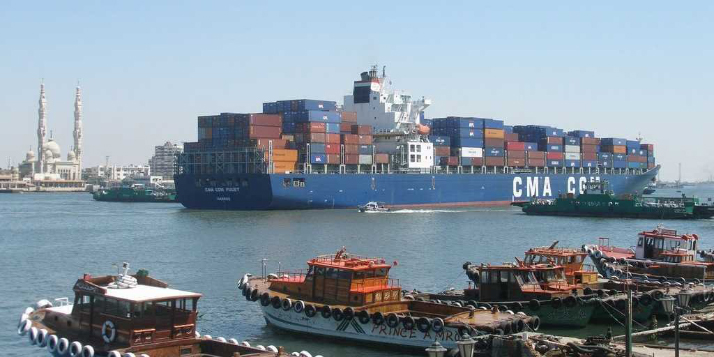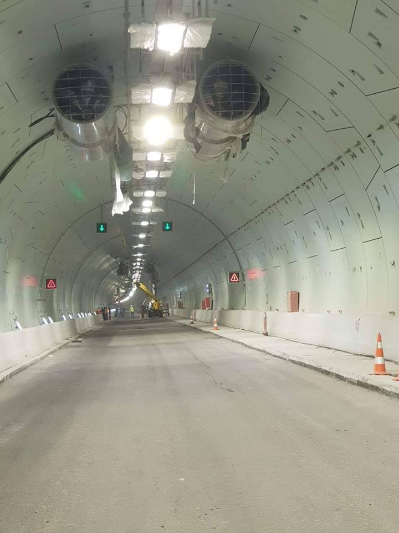|
||||||||||
| Home Nation World Business Opinion Lifestyle ChinAfrica Multimedia Columnists Documents Special Reports |
|
||||||||||
| Home Nation World Business Opinion Lifestyle ChinAfrica Multimedia Columnists Documents Special Reports |
| ChinAfrica |
| Sino-Egyptian Ties Flourishing |
| Cooperation in infrastructure and industrialization providing win-win development |
| By Hazem Samir ·2019-04-25 |

The Suez Canal strategic waterway (COURTESY PHOTO)
Sino-Egyptian ties have risen to unprecedented levels in the last five years, reaching comprehensive strategic partnership. The relationship is bound to strengthen even further when Egyptian President Abdul Fatah Al-Sisi visits China at the end of April, to take part in the Second Belt and Road Forum for International Cooperation in Beijing. There, Al-Sisi is expected to discuss further collaboration during his talks with Chinese President Xi Jinping.
Since Al-Sisi became president in 2014, he has cemented relations with China – it was the first country he visited abroad as leader. In 2016, Xi paid a state visit to Egypt, culminating in a number of economic, educational and cultural agreements being signed.
Al-Sisi and Xi have held a total of six meetings in the past four years, the last one being on the sidelines of the Beijing Summit of the Forum on China-Africa Cooperation in September 2018.
Attracting investment
"Egypt is keen on diversifying its ties with the world's different countries and wants to benefit from the experience of China, the world's second largest economy, especially in industrialization and infrastructure projects," said Nadia Helmy, senior professor of economics at Beni Suef University told ChinAfrica.
Helmy, an expert in Sino-Egyptian affairs, added that Egypt enjoys a unique geographical location linking Africa with Europe through the Suez Canal and the country "will play a pivotal role in the Belt and Road Initiative."
In 2015, Egypt inaugurated a newly-expanded Suez Canal to allow two-way traffic and reduce the waiting times for ships. By providing high-level logistic services to vessels coming from different parts of the world, it is expected that Egypt will double Suez Canal revenues from $5.3 billion to $13.2 billion in 2023, according to a visibility study conducted by some state institutions.
Establishing a mega industrial zone around one of the vital waterways of the global economy has allowed Egypt to attract foreign investments worth billions of dollars. China was one of the first countries to invest in the zone, under the Belt and Road Initiative launched by Xi in 2013.
Launching the Belt and Road Initiative, which seeks to connect Asia with Africa and Europe and beyond, China is cooperating in development projects through constructing infrastructure in various fields including transportation, energy and industrialization.
In 2017, Chinese industrial developer Tianjin Economic-Technological Development Area (TEDA) finished the first phase of developing the Suez Canal Economic Zone (SCEZ) with a total investment of $55 million. Having completed the first phase, TEDA is currently developing another 6-square-km area in the same region in Ain Sokhna District, Suez Province, east of the Egyptian capital Cairo.
TEDA, which achieved tangible success in the western part of the SCEZ, managed to attract many enterprises, including China Jushi Co., Ltd., the world's largest fiberglass manufacturer, which put Egypt at the forefront of the fiberglass producers in the world over the past year. Additionally, TEDA drew in another eight companies which will set up operations in first phase of the SCEZ.
"Investments in the SCEZ will create job opportunities for the [local] people, and with this mega project, we can ensure a promising future for our children," said Helmy.
According to official estimations carried out by Egypt's Ministry of Planning, Follow-Up and Administrative Reform, SCEZ will provide tens of thousands of jobs for Egyptians and contribute to a projected increase in the economic growth rate reaching 6 percent by 2023.

Infrastructure projects
One of the major infrastructure projects in Egypt is a smart Central Business District being built in Egypt's new administrative capital, some 45 km east of Cairo.
The work is undertaken by the China State Construction Engineering Corp. in the collaboration with their Egyptian counterparts, and includes a 385-meter-high Iconic Tower which will be the tallest building in Africa. In addition, a new high-speed rail line will link the new administrative capital to Tenth of Ramadan City and Cairo.
Besides the construction works, Egypt has also made use of Chinese experience in the field of energy. Egypt and China's clean energy company TBEA Sunoasis recently installed three of four solar power stations in the Benban Solar Plant with an output capacity of 186 mw. Located in the south province of Aswan, the Benban Solar Plant, after its completion, aims to generate up to 2 gw of utility-scale solar capacity through a total of 40 projects.
Lynn Xia, TBEA's Vice President of Overseas Business, told Xinhua News Agency that the plant is going to be one of the largest in the world.
In addition, a number of power plants are also being built in the Red Sea Governorate.
Along with the growth in infrastructure projects cooperation, the total trade volume between China and Egypt reached $13.87 billion in 2018, according to Han Bing, Minister Counselor for Economic Affairs at the Chinese Embassy in Cairo. Egyptian exports to China reached $2 billion for the first time in 2018.
Egypt seeks to narrow the deficit in the trade balance with China by doubling exports, which will include textiles and furniture, along with some agricultural products and fish.
"Egypt and China enjoy distinguished relations that have been elevated in the last few years to the level of comprehensive strategic partnership," said Abd El-Monem Fawzy, an expert in China-Africa relations at the Al-Gomhuria Center for Strategic Research.
Explaining why ties between both countries developed into a comprehensive strategic partnership, Fawzy told ChinAfrica that the partnership is a manifestation of the will of the presidents of both countries to strengthen bonds and collaboration between the two peoples.
"Within the framework of the economic reform program and Egypt's Vision 2030, Egypt is looking for foreign investors to pour foreign capital into the economy and strives to accomplish development in many different aspects. In turn, China seeks to put the Belt and Road Initiative into action with participating countries and expand its investments around the world. So, it is a win-win situation," said Fawzy.
He added that the stance of both countries in dealing with global issues corresponds with each other.
"China adopted a policy based on spreading peace and enhancing development. Similarly, Egypt calls for peace by cementing cooperation for peoples' interest," said Fawzy.
He predicted further agreements with the Chinese side during the Egyptian president's visit to China this month.
|
||||||||||||
| About Us | Contact Us | Advertise with Us | Subscribe |
| Copyright Beijing Review All rights reserved 京ICP备08005356号-5 京公网安备110102005860号 |